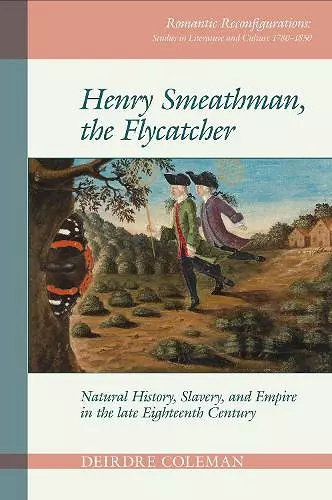Henry Smeathman, the Flycatcher
Natural History, Slavery, and Empire in the Late Eighteenth Century
Format:Hardback
Publisher:Liverpool University Press
Published:11th Jun '18
Should be back in stock very soon

In 1771 Joseph Banks and other wealthy collectors sent a talented, self-taught naturalist to Sierra Leone to collect all things rare and curious, from moths to monkeys. Henry Smeathman’s expedition to the West African coast, which coincided with a steep rise in British slave trading in this area, lasted four years during which time he built a house on the Banana Islands, married into the coast’s ruling dynasties, and managed to negotiate the tricky life of a ‘stranger’ bound to his landlord and local customs. In this book, which draws on a rich and little-known archive of journals and letters, Coleman retraces Smeathman’s life as he shuttled between his home on the Bananas and two key Liverpool trading forts—Bunce Island and the Isles de Los. In the logistical challenges of tropical collecting and the dispatch of specimens across the middle passage we see the close connection between science and slavery. We also see the hardening of Smeathman’s attitude towards the slaves, a change of sentiment which was later reversed by four years in the West Indies. The book concludes with the 'Flycatcher' back in London - a celebrated termite specialist, eager to return to West Africa to establish a free, antislavery settlement.
'This is a well-researched and engaging interpretive biography of an important, yet relatively unknown late eighteenth-century traveling naturalist. […] Smeathman is an intriguing figure whose life story deserves to be told, especially as it is contextualized by Coleman, whose marvellous eye for detail matches that of her subject. Smeathman had always intended to write a history of his “voyages and travels,” but did not live long enough to do so. Through Coleman, this story is finally being told. This book makes a new and important contribution to our understanding of eighteenth-century subaltern natural history and the history of African slavery.'
Alan Bewell, Professor of English, University of Toronto
'Smeathman skrev en redogörelse för sin Middle Passage: "Oeconomy of a Slave Ship", ett manuskript som nu publicerats av Coleman (s. 246-252). Texten och hennes kommentarer är intressant läsning för alla som har ett mer än flyktigt intresse för den atlantiska slavhandelns grymheter... Coleman försöker trots sin uttalade försiktighet att kontextualisera både Smeathmans kritik av slaveriet och hans eget engagemang i handeln, i sig en historiografisk utmaning.''Smeathman wrote an account of his Middle Passage: "Oeconomy of a Slave Ship ", a manuscript now published by Coleman (pp. 246-252). The text and her comments are interesting reading for anyone who has one more than fleeting interest in the atrocities of the Atlantic slave trade... Coleman tries to contextualize both Smeathman's critique of slavery and his own involvement intrade, in itself a historiographical challenge.'Fredrik Thomasson, Historisk Tidskrift
'The book will prove a valuable resource for scholars working on the history of scientific collecting in the period and the fraught relation between the network of collectors who sustained British empiricism in the eighteenth century and natural philosophers like Banks... it is especially illuminating in what it reveals about the contribution of the transatlantic slave trade to the pursuit of natural history.'
Devin Griffiths, European Romantic Review
ISBN: 9781786940537
Dimensions: unknown
Weight: unknown
336 pages